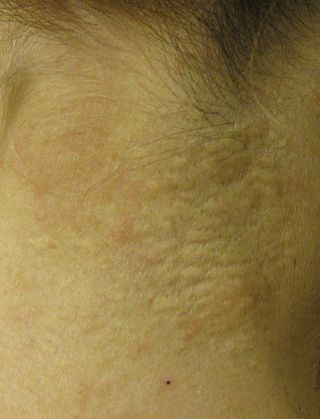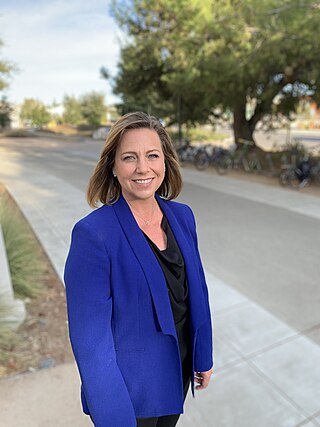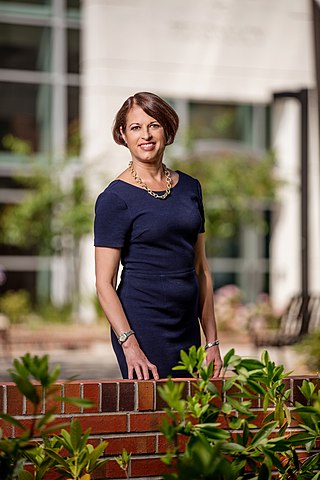A rare disease is a disease that affects a small percentage of the population. In some parts of the world, the term orphan disease describes a rare disease whose rarity results in little or no funding or research for treatments, without financial incentives from governments or other agencies. Orphan drugs are medications targeting orphan diseases.

Kathy Giusti is a business leader and a healthcare disrupter. She is a two-time cancer survivor having been diagnosed with multiple myeloma and breast cancer. Kathy Co-Founded the Multiple Myeloma Research Foundation where she was CEO and president for nearly two decades. She also co-chaired the Harvard Business School (HBS) Kraft Precision Medicine Accelerator, which she helped found, as a Senior Fellow at Harvard Business School.

Pseudoxanthoma elasticum (PXE) is a genetic disease that causes mineralization of elastic fibers in some tissues. The most common problems arise in the skin and eyes, and later in blood vessels in the form of premature atherosclerosis. PXE is caused by autosomal recessive mutations in the ABCC6 gene on the short arm of chromosome 16 (16p13.1).

Multidrug resistance-associated protein 6 (MRP6) also known as ATP-binding cassette sub-family C member 6 (ABCC6) and multi-specific organic anion transporter E (MOAT-E) is a protein that in humans is encoded by the ABCC6 gene. The protein encoded by the ABCC6 gene is a member of the superfamily of ATP-binding cassette (ABC) transporters.

Genetic Alliance is a nonprofit organization, founded in 1986 by Joan O. Weiss, working with Victor A. McKusick, to advocate for health benefits in the accelerating field of genomic research. This organization is a network of over 1,000 disease advocacy organizations, universities, government organizations, private companies, and public policy organizations. They aim to advance genetic research agendas toward health benefit by engaging a broad range of stakeholders, including healthcare providers, researchers, industry professionals, public policy leaders, as well as individuals, families and communities. They create programs using a collaborative approach, and aim to increase efficiency and reduce obstacles in genetic research, while ensuring that voices from the involved disease communities are heard. They also promote public policies to advance healthcare. Genetic Alliance provides technical support and informational resources to guide disease-specific advocacy organizations in being their own research advocates. They also maintain a biobank as a central storage facility for several organizations who otherwise would not have the infrastructure to maintain their own repository.

Elizabeth Nabel is an American cardiologist and Executive Vice President of Strategy at ModeX Therapeutics and OPKO Health. Prior to this role, she served as President of Brigham Health and its Brigham and Women's Hospital, Professor of Medicine at Harvard Medical School, and Director of the NIH's National Heart, Lung, and Blood Institute.

Buschke–Ollendorff syndrome (BOS) is a rare genetic skin disorder associated with LEMD3 that typically presents with widespread painless papules.

Francis Sellers Collins is an American physician-scientist who discovered the genes associated with a number of diseases and led the Human Genome Project. He served as director of the National Institutes of Health (NIH) in Bethesda, Maryland, from 17 August 2009 to 19 December 2021, serving under three presidents.

Arterial calcification due to deficiency of CD73 (ACDC) is a rare genetic disorder that causes calcium buildup in the arteries and joints of the hands and feet, and other areas below the waist. Although patients exhibiting these symptoms have been identified as early as 1914, this disorder had not been studied extensively until recently. The identification of the specific ACDC gene and mutations occurred in 2011. ACDC is caused by a mutation in the NT5E gene, which prevents calcium-removing agents from functioning,. Patients with this mutation experience chronic pain, difficulty moving, and increased risk of cardiovascular problems. In experiments at the molecular level, treatment with adenosine or a phosphatase inhibitor reversed and prevented calcification, suggesting they could be used as possible treatment methods. There is currently no cure for ACDC, and patients have limited treatment options which focus primarily on removal of blood calcium and improving mobility.
The Rare Diseases Clinical Research Network (RDCRN) is funded by the National Institutes of Health (NIH) and led by the National Center for Advancing Translational Sciences (NCATS) through its Division of Rare Diseases Research Innovation (DRDRI). The RDCRN is designed to advance medical research on rare diseases by providing support for clinical studies and facilitating collaboration, study enrollment, and data sharing. Through the RDCRN consortia, physician scientists and their multidisciplinary teams work together with patient advocacy groups to study more than 200 rare diseases at sites across the nation.
The Rare Diseases Clinical Research Network (RDCRN) Contact Registry is a patient contact registry started in 2004 and sponsored by the National Institutes of Health (NIH). The RDCRN Contact Registry collects and stores the contact information of people who want to participate in RDCRN-sponsored research or learn more about RDCRN research. It connects patients with researchers in order to advance rare disease research.

Kenneth Offit is an American cancer geneticist and oncologist known for his discoveries with respect to the genetic bases of breast, colorectal, and lymphoid cancers. He is currently Chief of the Clinical Genetics Service and the Robert and Kate Niehaus Chair in Inherited Cancer Genomics at Memorial Sloan Kettering Cancer Center. Offit is also a member of the Program in Cancer Biology and Genetics at the Sloan-Kettering Institute and Professor of Medicine and Healthcare Policy and Research at Weill Cornell Medical College. He was previously a member of both the Board of Scientific Counselors of the National Cancer Institute and the Evaluation of Genomic Applications in Practice and Prevention working group of the U.S. Centers for Disease Control.

Consuelo H. Wilkins is an American physician, biomedical researcher, and health equity expert. She is Senior Vice President and Senior Associate Dean for Health Equity and Inclusive Excellence at Vanderbilt University Medical Center. She is a professor of medicine in the Department of Medicine, Division of Geriatrics at Vanderbilt University School of Medicine and has a joint appointment at Meharry Medical College. She additionally serves as one of the principal investigators of the Vanderbilt Clinical and Translational Science Award, Director of the Meharry-Vanderbilt Community Engaged Research Core (CTSA) and as vice president for Health Equity at Vanderbilt University Medical Center.
The All of Us Research Program is a research program created in 2015 during the tenure of Barack Obama with $130 million in funding that aims to make advances in tailoring medical care to the individual. The mission of All of Us is to accelerate health and medical breakthroughs, enabling individualized prevention, treatment and care.

Jonna Ann Keener Mazet is an American epidemiologist and Executive Director of the University of California, Davis One Health Institute. Recognized for her innovative and holistic approach to emerging environmental and global health threats, she is an elected member of the National Academy of Medicine and a fellow of the American Association for the Advancement of Science. Mazet is a professor of Epidemiology and Disease Ecology at the UC Davis School of Veterinary Medicine, where she focuses on global health problem solving, especially for emerging infectious disease and conservation challenges.

Kathleen Ries Merikangas is the Chief of the Genetic Epidemiology Research Branch in the Intramural Research Program at the National Institute of Mental Health (NIMH) and an adjunct professor of epidemiology at the Johns Hopkins Bloomberg School of Public Health. She has published more than 300 papers, and is best known for her work in adolescent mental disorders.

Jacquelyn Taylor is the Helen F. Petit Endowed Professor of Nursing at Columbia University School of Nursing (CUSON), where she is also the Founding Executive Director of the Center for Research on People of Color (CRPC). Dr. Taylor is also the Founding Executive Director of the Kathleen Hickey Endowed Lectureship on Cardiovascular Care, the first endowed lectureship honoring a nurse scientist at Columbia University. Additionally, Dr. Taylor holds an administrative role as Senior Advisor to the Chair of the Division of Cardiology at Columbia University Medical Center. Dr. Taylor has been a trailblazer in cardiovascular genomics research among minority populations, and diversity and inclusion efforts, having been the first black woman to earn tenure at CUSON, New York University School of Nursing, and the Yale School of Nursing. Dr. Taylor has been recognized for her contributions to the advancement of biomedical sciences, health care, and public health, having been elected to the National Academy of Medicine in 2019. Dr. Taylor is committed to mentoring and advancing health equity as she received the Columbia University Irving Medical Center 2021 Mentor of the Year Award and the 2021 Friends of the National Institute of Nursing Research (FNINR) President's Award for her significant work in race, culture, and disparities in healthcare. Dr. Taylor has been PI of many studies including, but not limited to, an R01 from National Institute of Nursing Research (NINR)- The Intergenerational Impact of Genetic and Psychological Factors on Blood Pressure (InterGEN), a Presidential Early Career Award for Scientists and Engineers (PECASE) award from President Obama in 2017, an MPI on a P20 from NINR on Precision Health in Diverse Populations in 2018, an MPI on an R25 on Research Opportunities in Cardiovascular Diseases for Minority Undergrad and Grad Students Across the Health Sciences (RECV) in 2020, an MPI of the TRANSFORM TL1 in 2021, and MPI on a NHLBI funded T32 on Postdoctoral Training in Atherosclerosis in 2022. In 2023, she was awarded grants as MPI on an NHLBI funded R01 on 'The Impact of a race-Based stress reduction intervention on well-being, inflammation, and DNA methylation on Older African American Women at Risk for Cardiometabolic Disease' (RiSE) and a NIMHD funded R01 'Identifying and reducing stigmatizing language in home healthcare' (ENGAGE), and MPI of a U54 from NICHD on NY-Community-Hospital-Academic Maternal Health Equity Partnerships (NY-CHAMP), and PI of its training core. In addition to leading these grants, Dr. Taylor founded the Office of Diversity and Inclusion at the Yale School of Nursing and served as its inaugural Associate Dean of Diversity, and then went on to become the inaugural Endowed Chair of Health Equity and to develop and direct the Meyers Biological Laboratory at NYU before joining Columbia University.

Julie Ann Johnson is an American clinical pharmacist and translational scientist. She currently serves as associate dean for clinical and translational research and holds the Dr. Samuel T. and Lois Felts Mercer Professorship of Medicine and Pharmacology at The Ohio State University College of Medicine. She is also associate vice president for research at Ohio State. Johnson comes to Ohio State from the University of Florida, where she was dean emeritus of pharmacy and a distinguished professor of pharmacy and medicine in the Department of Pharmacotherapy & Translational Research. For four consecutive years, she was a Clarivate Analytics Highly Cited Researcher in Pharmacology and Toxicology, indicating she was one of the "world's leading scholars in the sciences and social sciences in the preceding decade."

Patricia Silveyra is an Argentine-American lung physiologist, professor, and chair of Environmental and Occupational Health at Indiana University School of Public Health. Her research interests include sex differences in innate immunity, lung disease, air pollution exposure effects, and mechanisms by which sex hormones control lung immunity.

Elizabeth "Beth" Mayer-Davis is an American nutritionist who is the Cary C. Boshamer Distinguished Professor at the UNC Gillings School of Global Public Health. She is the Director of the University of North Carolina at Chapel Hill Nutrition Obesity Research Center, and Dean of the UNC Graduate School. She has sought to better understand diabetes. She was awarded the 2019 American Diabetes Association Kelly West Award.
















